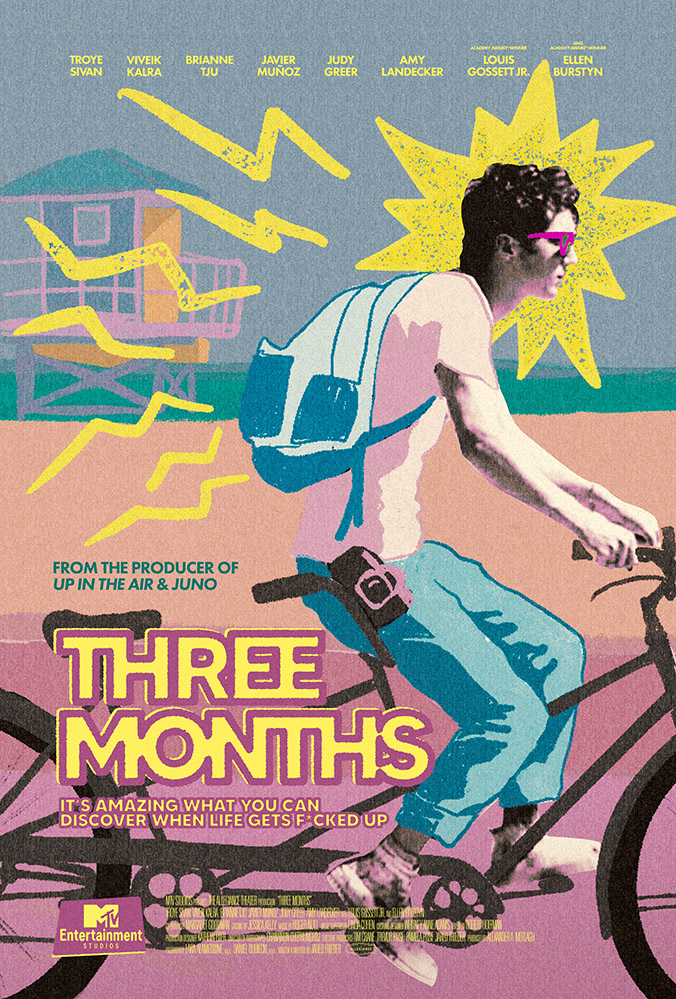As Troye Sivan teams up with fellow actors Viviek Kalra and Brianne Tju for new film Three Months, he hopes that it’s a movie that make an impact on the lives of people.
It’s hard to see how it couldn’t, really. Three Months is the brainchild of writer Jared Frieder, taken from his own experiences with waiting for the results of a HIV test.
“Seven days before my graduation from college, a condom broke,” Frieder recalls. “As a neurotic gay Jew with at least two anxiety disorders, you can only imagine how thrilled I was to learn that one must wait three months after getting exposed to HIV to find out if you have it or not.
“In that moment, I thought two things: one, fuck me, and two, this would make a great movie.”
A film nine years in the making, Three Months tells the story of Caleb (Sivan) who is exposed to HIV on the heels of his high school graduation and must wait the three months it takes to get tested for the disease. As the film progresses, Caleb, his love interest Estha (Kalra), and friend Dara (Tju), ultimately discover love in the unlikeliest of places while learning that the prospect of HIV is no longer the death sentence it once was.
Of course, for a film that focuses on the topic of waiting, it arrives at a pertinent time in history. Not only does it arrive when waiting for COVID diagnoses, or spending time in quarantine is considered the norm, but it arrives following a protracted period of production as well. As Frieder explained, the film went into production in March of 2020. As he succinctly put it; “After two weeks of filming, we were shut down by a global pandemic. A movie about a virus taken down by a virus. A movie about waiting forced to wait.”
With Three Months making its premiere in the US on February 23rd (and arriving on Paramount Plus in Australia on March 1st), Sivan, Kalra, and Tju spoke to Rolling Stone Australia about the process of making the film, and the importance of its message in a time such as this.
I have to say, when I first read the synopsis of ‘Three Months’, I didn’t exactly expect to see the words ‘comedy-drama’ in the same sentence as HIV. However, the subject matter is dealt with quite well, and quite respectfully. How did you all feel when you first received Jared’s script?
TS: I think that was kind of what drew me to it. Of course, given the history of HIV, the heavy drama that we’ve seen time and time again of these terribly sad stories about HIV/AIDS completely have a place and are so valid as part of our history, but I was also really excited about the idea of acknowledging that is something that is in fact history and not something of the present.
So we’ve come such a long way, and yet for some reason, the stigma and shame around HIV testing and the disease in general is still prevalent and still so present. So I saw this as a weirdly accessible, fun movie that… y’know, my hope was that the fact that it is so accessible and such a fun watch would push this conversation to places where I think it wouldn’t reach otherwise.
VK: I think a light-hearted tone can be much more beneficial in terms of actually drawing people in to watch something. There is that sort of old idea – I don’t know if it’s true, maybe it’s just a myth – that when we laugh, you register things more. It’s like when you’re laughing at school, whatever it is is pressed in your mind slightly more. So it’s nice to come at it from this angle.
It’s very important to deal with topics of this magnitude in a humanising, normalising manner such as this. With that in mind, do you all feel an increased level of responsibility when you take on roles like this?
BT: Absolutely. Not only were we dealing with something so important and needed to be open for discussion, and available and accessible for people, but we were also dealing with Jared Frieder’s – our director and writer – story. Y’know, it’s based off of his experiences in life, so I felt a sense of responsibility to do justice by him for a script that was written nine years ago and he cares about so, so much.
So in return, it made us care about it so much. And also knowing that we have such great intentions for this film, and I think it has such great potential to open a conversation where we’re at currently with HIV and AIDS. And this movie is truly a celebration of life, and by making it a comedy we can really relay that message and show where we’re at now, and that with or without AIDS or HIV or whatever Caleb’s diagnosis ends up being, is that he has this long, beautiful life ahead of him. The same as anyone else dealing with it.

Photo courtesy of MTV Entertainment Studios
There’s also a strange sense of irony in the fact that this is a movie about a virus and waiting, but it was also sidelined by a virus that all caused you to wait. With that in mind, what was the production of the film actually like? It would’ve been a little more protracted than a standard production cycle.
TS: Definitely, yeah. We were filming in… we started in late Feb 2020 and shot until like, March 17th or something. I thought I was going to stay in Atlanta for like, two weeks, and wait for the whole thing to blow over, and then I was on a flight to Australia the next day and didn’t leave for six months. Even when I did leave, I had to get an exemption – there was no one else at the airport, there was like five people on my flight.
It was the most surreal experience, and ultimately – you touched on this – in the weirdest way, it made me relate to Caleb more and relate to the story more. And I think my hope is that audiences are going to be able to relate a lot more. Themes of health anxiety and waiting are some things that I think we understand so much better than we did two years ago, unfortunately. So I’m interested to see how it sort of lands with audiences.
VK: [It was a] super bizarre time – just the idea of filming between such a crazy time was just bizarre. I remember as things were shutting down in the world – like Troye was saying – as we started filming, I was on the phone and my agent at the time who I no longer work with was… We were talking and I was like, “I need to get out of here.”
And there was one person on the phone who was quite relaxed about it, and said, “You’ll get repatriated on the flight back.” I’m like, “You’re far to calm [laughs], I need to get out of here.” So getting out and then coming back into it, and getting into it where things are still… the waters were not so clear with it. But we got it done, and I was very grateful to be getting it done with Troye and Brianne, which made things quite fun.
And Troye, a question for yourself: it’d been a couple of years since you last took on a major acting role such as this. How did it feel to get back into the swing of things?
TS: It was really fun. It was definitely disjointed because of the pause and everything like that. But yeah, I knew that I wanted to be a part of this movie, I knew that regardless of anything else, I wanted to scream the message of the film from the rooftops – which is, again, with access to healthcare, people who have HIV where undetectable means untransmittable; you can absolutely go and live a long and happy life. And that was the thing that I really wanted to shine some light on.
So it just felt… It kind of took away all the pressure of like, “Is this the right move?” Any of that vanity stuff kind of went out the window when I realised how impactful it could be. If it only reaches ten people, that’s totally fine by me. As long as it makes some kind of difference in one of those person’s lives.






































